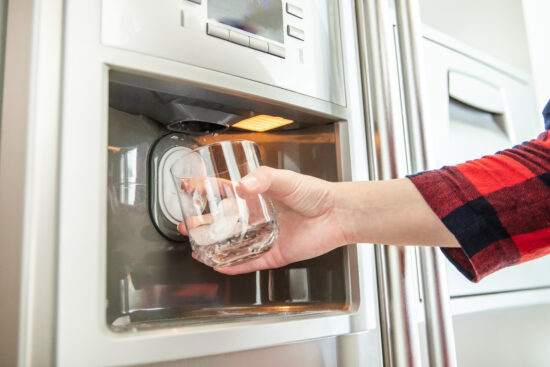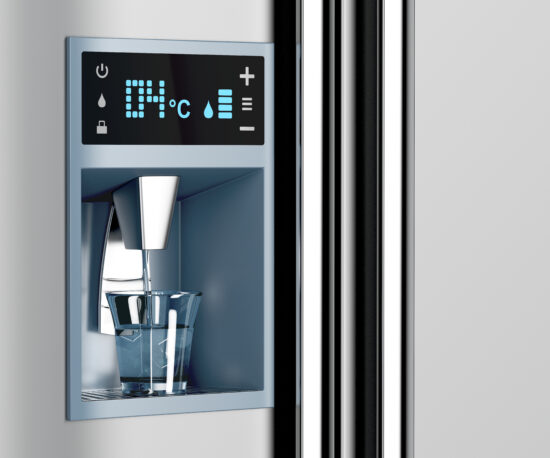Are you wondering how long your refrigerator water filter should last? Do you want to know when it’s time to replace it? If so, this blog post is for you! We’ll cover the basics of refrigerator water filters and tips on ensuring your filter last as long as possible.
Table Of Contents
−- How long do refrigerator water filters last?
- Types of refrigerator water filters
- What Factors Impact the Lifespan of a Refrigerator Water Filter?
- Signs That You Need to Replace Your Filter Immediately
- Maintenance tips to prolong the lifespan of a refrigerator filter
- Alternatives to refrigerator filters
- How to Dispose of Used Filters
- Conclusion
How long do refrigerator water filters last?
Generally, refrigerator water filters have an average shelf life of six months, depending on the quality of the water supply and the amount of water passing through the filter.

Most manufacturers recommend replacement every six months or 400–600 gallons of filtered water, but many factors can affect their longevity. Although they can be expensive to replace, they are necessary to ensure that your family has clean, safe drinking water.
Types of refrigerator water filters
Refrigerator water filters come in various types and sizes to fit the needs of any household. The most common type of refrigerator water filter is an inline filter installed directly into the water line supplying the fridge.
This filter is relatively easy to install and replace and can filter out large particles such as rust, sediment, and chlorine. In addition to inline filters, drop-in filters are placed inside the refrigerator water dispenser. These filters effectively remove smaller particles, such as bacteria and cysts.
Finally, some refrigerators have built-in water filtration systems that require little to no maintenance. While these systems are more expensive than other filters, they typically last many years and provide a constant supply of clean drinking water.
What Factors Impact the Lifespan of a Refrigerator Water Filter?
The lifespan of a refrigerator water filter can be affected by various factors, including water quality, frequency of use, filter size, and type.
Water quality
The water entering the filter may contain contaminants like dirt, rust, and sediment, which can reduce the filter’s effectiveness over time. The amount and type of contaminants in the water can also impact how often you need to replace your filter.
If your water supply contains high amounts of sediment or other impurities, you may need to replace your filter more frequently. On the other hand, if you have relatively clean water coming into your home, you may not need to replace it as often.
Frequent use
If a family of four uses their water dispenser and ice maker often, they should get a new filter every six months. If your filter needs to be changed more often, you should consider installing a larger filter with a higher capacity to handle the increased flow rate. Additionally, if you are in an area with hard water, you may need to replace your filters more frequently due to mineral buildup.
Filter size and type
The filter size will depend on your refrigerator type, so it’s important to check with your manufacturer to determine the right filter for your model. Different filters also last for different lengths of time; for instance, activated carbon filters typically last longer than reverse osmosis filters. Different filters also have different levels of effectiveness, so you should consider lifespan and performance when making your choice.
Signs That You Need to Replace Your Filter Immediately

It’s important to pay attention to the signs that indicate it’s time to replace your filter.
Discolored water or ice cubes
One of the most obvious signs that you need to replace your refrigerator water filter is discolored or cloudy-looking water or ice cubes. This is usually caused by sediment, dirt, rust, and other particles not filtered out by the filter. If you notice discoloration in your water or ice cubes, it’s time to replace the filter.
Unusual tastes or smells
If you notice any unusual tastes or smells coming from your refrigerator water filter, it is time to replace it. This could indicate that the filter can no longer effectively remove contaminants from your water, leaving your drinking water with a strange taste or smell.
Poor water quality can also affect the taste and smell of ice cubes, so if you notice anything unusual, it’s best to take action immediately. The consensus among most refrigerator manufacturers is that you should change your water filter every six months, so check to make sure yours is still in good condition and replace it if necessary.
Leaks in the filter or refrigerator
If you notice water seeping from the filter or anywhere else in the refrigerator, this could indicate a clogged or faulty filter. This may reduce water pressure and signal that replacing the filter is time. Check the manufacturer’s recommendations for replacement intervals and, if necessary, contact customer service if you have any questions.
Reduced water pressure
If you see a decrease in the flow or pressure of your water, it’s time to replace your filter. Several factors can contribute to reduced water pressure, but the most common issue is an overused filter.
Frequent use, water quality, and filter size and type affect how quickly the filter becomes clogged. It’s important to replace your refrigerator water filter every 6 months or sooner if you notice a decrease in flow or pressure.
Maintenance tips to prolong the lifespan of a refrigerator filter
Maintaining your refrigerator water filter is important in functioning properly and extending its lifespan. To prolong the life of your filter, ensure that you regularly clean the filter housing and the screen and grille of the filter.
Additionally, avoid drinking water with high levels of sediment or chlorine and flush the system periodically to help remove debris buildup. Finally, check your filter frequently for signs of wear and tear or damage, as this can reduce its efficiency and shorten its lifespan.
Tips to save money on replacing filters
One way to save money on replacing refrigerator water filters is to purchase a filter subscription. Many filter companies offer subscription plans for regular filter replacements. This can be a great way to save on buying each filter individually. Additionally, some companies offer discounts for bulk purchases.
Purchasing multiple filters at once can be an economical way to stock up and ensure uninterrupted clean water flow. Another option is to opt for a generic, less expensive filter that offers comparable quality to the name-brand version. This can also help you save money without sacrificing quality.
Alternatives to refrigerator filters
For those who are looking for alternatives to refrigerator water filters, there are many options available. These include using a whole-house water filtration system, installing a faucet filter, or even investing in a reverse osmosis system. Whole house filtration systems are designed to filter the water coming into your home from the main line and provide clean, filtered water.
Faucet filters attach directly to your kitchen faucet, allowing you to filter the water. Reverse osmosis systems are designed to provide an even higher level of filtration than traditional filters. These options provide an effective way to filter water without requiring a refrigerator filter.
How to Dispose of Used Filters
When disposing of used water filters, following the manufacturer’s recommendations is important. If the filter is recyclable, there may be an option to send it back to the manufacturer or a recycling program to help reduce waste. Otherwise, the filter media should be disposed separately from the plastic filter shell.
The excess sand or charcoal should be scattered in your yard or emptied into your trash. Alternatively, if you don’t mind paying a small fee, you can send your used filters to recyclewaterfilters.com for proper disposal.
Unfortunately, not all refrigerator water filters are designed for recycling. Waste Management does not recycle refrigerator filters, so if your manufacturer does not have a recycling program, you may need to dispose of the filter in a landfill or other waste disposal facility.
Conclusion
In conclusion, refrigerator water filters are a great way to ensure that your drinking water is free of contaminants, but they must be replaced regularly. Regular maintenance and proper installation are key to ensuring the filter’s longevity while saving money in the long run.
Other options are available for those who want an alternative to refrigerator filters, such as filtration or reverse osmosis systems. With careful consideration and research, you’ll be able to find a system that meets your needs and budget.

Jay
Jay is a health and wellness enthusiast with expertise in water quality and nutrition. As a knowledgeable advocate for holistic well-being, Jay successfully manages Type 2 Diabetes through informed lifestyle choices. Committed to sharing reliable and authoritative insights, Jay combines firsthand experience with a passion for enhancing health."
